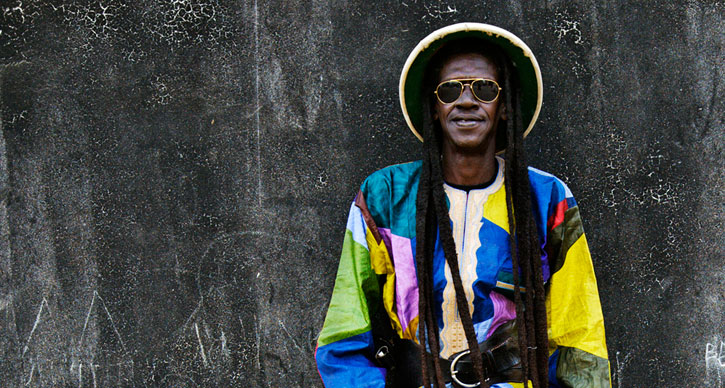Q&A with Cheikh Lô
 A superb singer and songwriter as well as a distinctive guitarist and drummer, Cheikh Lô blend of semi-acoustic flavors — West and Central African, funk, Cuban, flamenco — has been distilled into his most mature, focused, yet diverse statement today, his new album, Jamm. He performs at the Michigan Theater on April 13.
A superb singer and songwriter as well as a distinctive guitarist and drummer, Cheikh Lô blend of semi-acoustic flavors — West and Central African, funk, Cuban, flamenco — has been distilled into his most mature, focused, yet diverse statement today, his new album, Jamm. He performs at the Michigan Theater on April 13.
Jesse Hoffnung-Garskof is assistant professor of history, American culture, and Latina/o studies at the University of Michigan.
Jesse Hoffnung-Garskof: You now live in Senegal. But you are from Burkina Faso, which is a crossroads of many languages and cultures. What kinds of music did you hear in your house as a child?
Cheikh Lô: In my childhood, I heard all the music of Latin America and especially music from Cuba. This was music that came to West Africa. Congo and rumba were also heavily influenced by the music of West Africa. In the 70’s, I began to listen to pop music, soul, reggae, Jimmy Cliff, James Brown, and Michael Jackson, whom I remember seeing during his visit to Dakar in 1971.
JHG: On your latest album you sing a wonderful version of the song Seyni, which is a rumba. You even sing some of the lyrics in Spanish. I understand that this was the first song you ever sang in public. I think this may be surprising to audiences in Michigan. What was the importance of Cuban music for West African musicians of your generation?
Cheikh Lô: It was very important. We all started listening to that music and learned to play the chords on the guitar. It was a great reference for musicians of our generation. After Cuban music impacted us, it was music that had its origins in Africa and was created by Africans transported to America. The music of Cuba penetrated throughout West Africa and many musicians of my generation went to school there thanks to music scholarships.
JHG: You later moved to Dakar, one of the great musical capitals in Africa. There, you became known for your ability to blend the many popular musical traditions of the continent, especially Senegalese Mblax and Congolese Soukous. Please help our Michigan audience to understand these two styles.
Cheikh Lô: For me the combination of different styles has always been natural. From my beginnings in the first band I formed, there were musicians of all nationalities in Africa: Congo, Mali, and Burkina. Each sub-region of Africa has its specific characteristics. I have also spent time in hotels playing standards of Western music. The mixture of styles has always been natural in my career as an artist.
JHG: Of course, you have gone on to add other sounds as well. You toured with an all-star funk band led by Pewee Elis (who led James Brown’s band for years). He and Tony Allen (longtime drummer with Fela Kuti) appear on your new album. You also recorded in Bahia with Carlinhos Brown and Ile Aye. Can you tell us about your experiences collaborating with artists in the African diaspora?
Cheikh Lô: Being open to musical influences is very important and has always brought me many satisfactions. With Pewee, our long relationship has been extraordinary. He has worked in 3 of my 4 albums, and I hope our relationships continues to last over time. With Tony Allen, I remember when we met in 2004 at the concert “Black President.” I played the drums with Tony and another American drummer. The experience was incredible. Carlinhos Brown and I share a very similar vision of music, so collaborating is always fun.
JHG: Your lyrics are quite political. I think this might be lost on audiences in Michigan because most of us don’t understand Wolof, or Jula, or even French (although you would be amazed at how many Senegalese fans turned up when Baobab was here a few years ago). Can you explain the message of your songs Conia and Warico?
Cheikh Lô: For this I recommend reading the full transcriptions into French and English. They do a magnificent job of translation, and it’s well worth being read by the public in its entirety.
JHG: Speaking of politics, the last few years have seen a number of musicians move into political posts. Gilberto Gil was minister of culture in Brazil, Michel Martelly is now President of Haiti, Youssou N’Dour, who produced several of your albums, is running for President in Senegal. Barak Obama has been caught on film singing Al Green and B.B. King songs. Can we expect you to run for office?
Cheikh Lô: I do not think that I would devote myself to politics. It’s not my job. You have to be honest with yourself and know what your role is in life. Being a career politician is difficult and takes many years of work to be done well. I’ve worked with people in my community, not from a political standpoint but artistically. My mission will always be music. There is also corruption in politics, and I’m not willing to enter that world.
JHG: So what is next for Cheikh Lô?
Cheikh Lô: We want to have a big U.S. tour. Our group is trying to offer a wide range of music to American audiences with a show full of nuance and rhythm.







